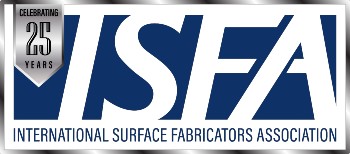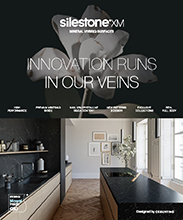- Home
- About ISFA
- Membership
- Events
- Resources & Training
- Countertops & Architectural Surfaces
- Sponsors
- Contact Us
|
Sustainability in Business Includes, but Goes Well Beyond, “Green” One of the maturing topics in business today is the concept of “sustainability.” Indeed it has been around a while and yet most often today it is heard of in the “planetary” context. That is, sustainability as it relates to the environment, recycling and “green” materials. However, there is a much broader definition of sustainability, one that is widely accepted and that ultimately relates to ethics and leadership — two compulsory dynamics in any “sustainable” business. The planetary aspect of sustainability is a relevant and core concept to the building materials industry. With LEED points and incentives for recycled material usage on the rise, commercial fabricators surely align themselves with some of the most viable options whose value proposition is reasonable, i.e., a sound price-to-value correlation. Thinking of sustainability in the broader sense brings about the concepts behind L.A.B.E.R : ■ Leadership ■ Accountability/Alignment ■ Best Practices ■ Ethics ■ Rights to Future Generations The sustainability here is a broad class of actions, mind-set, culture and behaviors that encourage long-term successful results. L.A.B.E.R. relates significantly to sustainability in a fabrication business. In fact, these aspects are endemic to any business. Drilling down into each ultimately reveals that: Sustainability is a function of leadership mind-set and core values. Leadership For any business to survive, any army to win a battle, any sports team to win, leadership is needed. Leadership is essential; it is the ordered energy infused in a system to give guidance, structure and sense of purpose. There are many aspects of leadership that transcend management. Leadership leads by example, inspires, guides, promotes, participates, perseveres and is confident yet humble. Leadership lubricates the operational flow and dares to be different and take risks as needed while not afraid to get in the trenches with the team. What few realize is that the truth with leadership is that leaders, even great leaders, generally do not have all of the answers. What they are superior at is, however, the ability to align, research and network to secure the best information upon which their decisions will be based. Leadership does not equal omniscience. Leadership is finding a way to get it done — as successfully as possible — using team resources and synergy. Similarly, captains of athletic teams are not always the highest goal scorer. Rookie prodigies, for example, often do not have the interpersonal or empathic skills to motivate and inspire. This often only comes with maturity and experience. So too follows the leadership model in business. Caution is necessary here. Owners must evaluate their management team and see if they are more adept at being a “boss” or being a leader, which are two very different groups of skills and mind-sets. Some manager types struggle with ego and cannot embrace leadership skills because of a quiet but powerful underlying sense of insecurity. To lead, you must embrace others without knowing all the answers. If one feels threatened by seeking advice and opinions, then they lack a necessary skill of leadership — humility and embracing a team mentality. Unfortunately, it is not uncommon to find a dynamic of “defensive protection” vs. “humble seeking.” This schism can produce disincentive to employees, selfishness and lack of promoting a true team environment, i.e., UNsustainable. Leaders also create corporate cultures and foster ideologies that center around incentives, integrity, levity, participation and teamwork which add to the overall mood and atmosphere, ultimately supporting the sustainability of the company. Any dynamic focused on reducing turnover greatly adds to sustainability. Leadership mind-set is a central pillar of sustainability. Emotionally intelligent leaders successfully execute the myriad strategies in their organization that support sustainability. Promoting a cooperative environment with teamwork and cross-functional ability is critical. [Note: Perhaps ironically, while this article discusses leadership as a pillar of sustainability, I have been drafting a manuscript on the subject from the reverse angle: how sustainability is a pillar of leadership — anticipated paperback release Q4 2017.] Accountability/Alignment Accountability is yet another pillar of sustainability because it enforces diligence, smokes out abuses and maintains team honesty and harmony. Accountability is a facet of alignment so this “A” in L.A.B.E.R is interchangeable. Accountability can have a negative connotation if it is meant to “check up” on your team. The proper way of looking at it is more as an aspect of positive management (or leadership) that encourages communication, reporting and result analysis. Anything that supports more communication subsequently supports alignment within the team function. Alignment creates synergy, and therein lies the foundation of sustainability. Communication, aiming for targets and sharing results all focus on accountability, which can maximize engagement. These operatives reduce uncertainty, elicit ideas for changes and adaptation and provide structure to a company’s goals. As such, accountability and alignment are essential to a company’s sustainability. Best Practices Best practices need to be documented and shared. The value of any individual is just that — the individuality they bring to the company and their role. Their mind-set, experiences, values, character and personality are integral parts of the synergistic effect of teamwork. Yet while each employee may have their own signature mode of operation, there is alignment in determining “best practices” for any given function. Here again, leadership must create the safe forum to communicate and share. This takes intention and follow-through. Best practices support alignment and structure, with anarchy exemplified as the polar opposite. Best practices allow for a stream of aligned modus operandi in which the individual can personalize the delivery. Focusing and sharing strategies, protocols and communications that have yielded positive empirical results and relationship building should be shared and supported. These best practices can only support the long-term economic and relational health of a company, i.e., sustainability. Ethics Ethics and integrity go a very long way in building trust. Business is all about relationships, such as relationships with your team and customers, and probably the most sustainable element of solid relationships is trust. Trust is built through alignment as well, that is, when a company’s actions match what they preach. Sometimes the most successful companies simply just do what they say they are going to do when they say they are going to do it. Ethics and integrity are part and parcel of sustainable leadership. A company’s C-Suite (or senior executive group) must choose to operate with integrity; the marketing department must creatively deliver the message; and operations and sales must follow the marketing mantras. Here again, having all of these parts of the business aligned, operating ethically and with integrity highly supports sustainability in an organization. Rights to Future Generations Rights to future generations (RFG) is often a highly debated philosophical platform. Can someone who is not even here have rights that are enforceable that might affect the bottom line now? On the other hand, if it is looked at from a personal point of view, one’s opinion may change. If we look at that future someone as a son or granddaughter who could inherit a safer and more beautiful environment — a business that is a true going concern built on a solid foundation of sustainability — does it then become more important? Many people will care much more about this aspect when it is personalized and related directly to someone for whom they care greatly. Succession planning is ubiquitous in small business. Whether it is estate planning, retirement planning and funding, safe operation initiatives (OSHA self-audit), tax liability mitigation or even developing a strategy to clean up pollution liabilities that may carry forward, all of these actions are aligned with sustainability. With RFG, sustainability is not only about creating a lasting business, but also takes on some of the planetary aspect mentioned above, that is, the environment. We cannot control city sewerage dumping into residential canals, etc., but we can enforce recycling programs in our shops and break rooms. We can alleviate that oil tank situation so as not to pass the liability into the future; we can protect our environments and labor by enforcing rules of safety and approved chemicals/products. Along these lines, there is currently a particular focus on silica, largely because of the recent changes in regulations. Being proactive about educating the dangers of silica respiration and enforcing the safety rules accordingly is directly related to a sustainable leadership mind-set that ties into the rights to future generations. Everyone in the company is important and serves a vital role — it should be the leadership mind-set to ensure the physical health and wellness of all employees. Sustainability is both a framework and a mind-set. Businesses today can increase the probability of longevity and success by employing the five central pillars of sustainability known as L.A.B.E.R. These pillars encompass both planetary and operational ideals whose central theme centers around alignment and synergy. Fabrication companies with a culture that supports L.A.B.E.R. will necessarily have a competitive advantage. It takes some long run thinking and perseverance, and with that comes tremendous momentum around sustainability. Planned and executed under the right leadership, sustainability becomes a means, not an end, which subsequently affords a happier and healthier lifestyle and a business optimally poised to hand down to future generations. About the Author Paul Max Le Pera is the Global Vice President of Sales & Marketing for Hirsch Glass & Spectrum Quartz, with 20 years’ experience in business and marketing strategy for the building materials industry. He can be reached at (908) 358- 5252 or [email protected]. |


